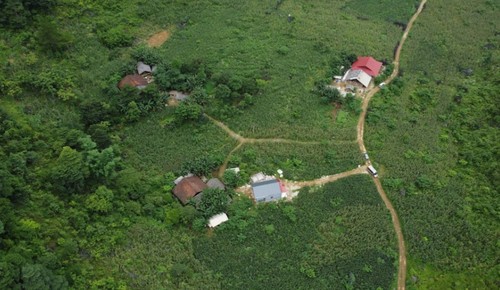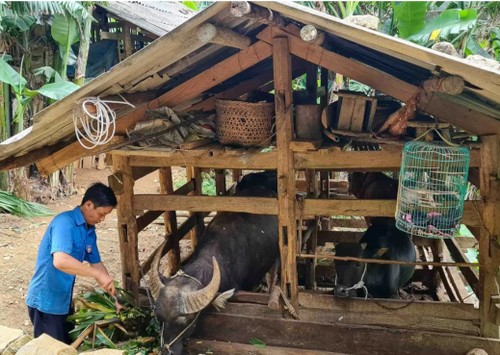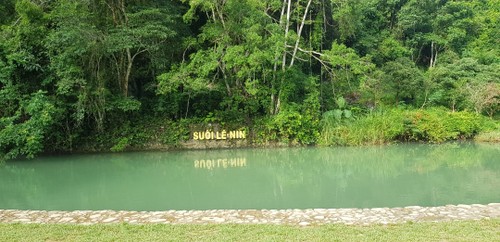 Aerial view of a corner of Thuong Thon commune in Ha Quang district (Photo: Ngoc Anh) Aerial view of a corner of Thuong Thon commune in Ha Quang district (Photo: Ngoc Anh) |
Ly Van No’s family in Thuong Thon commune, Ha Quang district, used to live in a cramped, dilapidated house built with old planks and bamboo poles. Thanks to the support of the local government, No’s family now lives in a spacious house with a concrete floor, wooden pillars, and corrugated iron roofing.
He recalled, “My family was given 1,600 USD by the government to build a house and buy a cow for breeding. It was dangerous living in our old, dilapidated house, especially when there was heavy rain and strong wind. We are now happy and feel more secure.”
 Le Van No feeding a buffalo (Photo: Ngoc Anh) Le Van No feeding a buffalo (Photo: Ngoc Anh) |
Ly Van No's family is one of many beneficiaries of a program to replace poor-quality housing for ethnic minorities in Ha Quang district. In 2020, the Ministry of Public Security and the Hanoi People's Committee provided resources to Cao Bang province to help 826 poor families to build a new house in Ha Quang district. Since 2021 Ha Quang has replaced 1,526 dilapidated houses.
Nguyen Thi Phuong, Deputy Chairwoman of the district People's Committee, said that by the end of next year all families living in unsafe houses will be assisted to build a new house. “In 2024, Ha Quang district was directed to eliminate 1,134 dilapidated houses. In the first half of the year, 450 new houses were built. But there have been some problems implementing the project,” said Phuong.
She took an example as follows people often study the horoscope of the house’s owner and want to wait for a propitious date to change houses. Sometimes a house is situated in a limestone area, making construction difficult. The first thing we do is talking to the family to find out what problems they have with our plan and then try to find a solution.
In its new-style rural building, Ha Quang district has prioritized a model of growing three types of crops and raising two kinds of animals. As a result, local incomes have increased 100 USD per person this year to nearly 1,000 USD per person.
Hoang Van Sy, a resident of Thuong Thon commune, Ha Quang district, said, “We used to struggle economically. In 2016 we changed our crop to hybrid corn, and began raising pigs and chickens. Recently we’ve gotten loans from the Bank for Social Policies to buy livestock and build a house. With that help, my family has escaped poverty.”
 Lenin Stream in Ha Quang district (Photo: Ngoc Anh) Lenin Stream in Ha Quang district (Photo: Ngoc Anh) |
Taking advantage of Pac Bo Special National Relic Site and many heritage sites in the Non Nuoc-Cao Bang UNESCO Global Geopark, Ha Quang district has turned to tourism development and is investing in transportation, telecommunications, clean water and other infrastructure.
Dam Mai Hoa, Deputy Chairwoman of the Thuong Thon communal People's Committee, said that the local administration will continue to build inter-village and inter-hamlet roads and deploy the models of growing key crops, raising buffaloes and cows for breeding, and switching our crops to arrowroot and hemp.
“Each household will receive one or two water tanks to store rainwater. We’ve proposed building square tanks and public water tanks so every household will have sufficient water every day,” Hoa said, adding “Through the Bank for Social Policies there’s a loan program for poor households in the commune which allows them to borrow 4,000 USD with an interest rate of 0.55% per month, so poor and near-poor households have access to loans and now have a total outstanding debt of 1.4 million USD.”
Pham Xuan Tung, Deputy Secretary of the Party Committee and Chairman of the People's Committee of Ha Quang district, said, “Since 2021, Ha Quang has made real progress in implementing national target programs.”
Now every commune has a road to the hamlet centers, 97% of hamlet clusters are connected to the national electricity grid, and almost every hamlet has access to communications waves. A reservoir and canal system gives people in the mountain areas sufficient water for their daily needs.
“We’ve paid special attention to production models linked through value chains to businesses, cooperatives, and the community. This has created stable livelihoods and incomes. The poverty rate in Ha Quang has fallen significantly since 2020, and the district could be poverty free by the end of next year,” Tung concluded.
Ha Quang district’s poverty households have decreased from 4% to 6% per year while the local people's lives have changed positively and social security has been guaranteed.